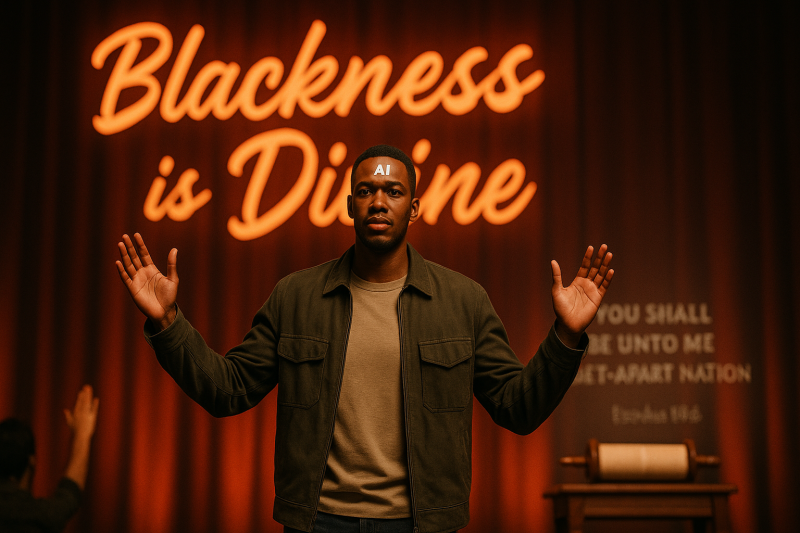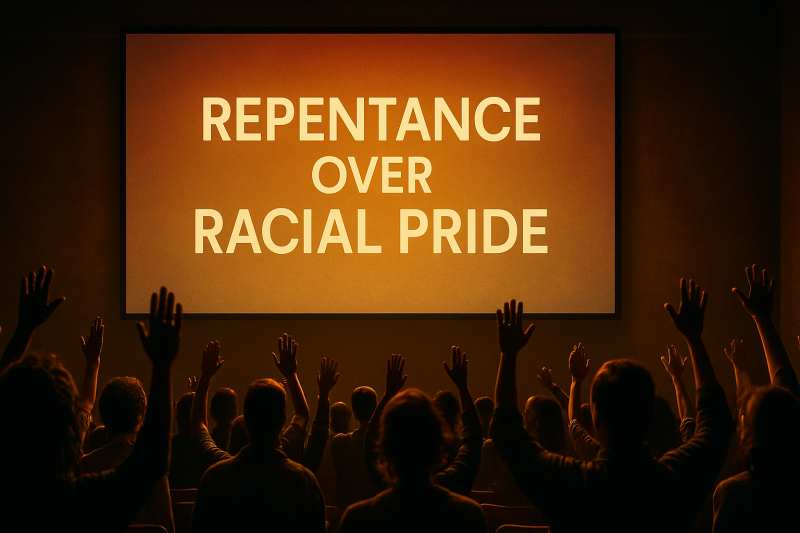🎧 Listen to This Blog: Click play to hear a full audio narration of this article. A viral AI-generated clip, with its poetic cadence, declares, “If I had to come down from heaven and show the world what divine love looks like, I’d choose to be born Black…”
Its warm tone, polished delivery, and emotional resonance have captivated millions, spreading across digital platforms and embedding itself in countless feeds. For those historically oppressed ones, it seems to offer a powerful affirmation of worth, a divine nod to their resilience. Beneath its alluring surface lies a crafted deception—not an innocent error, but a subtle distortion that undermines the Most High’s covenant identity. Artificial Intelligence is a marvel of human ingenuity—


complex algorithms, vast data, and predictive patterns—but it is not alive. It lacks a soul, divine breath, or moral will. Only beings created in the image of YaHU’aH, endowed with Ruach ha’Qadash, Set-apart Breath of the Most High, can embody divine roles. AI, devoid of this breath, cannot prophesy, discern truth, or bear divine authority. The viral clip’s claim that AI could “come down from heaven” or “choose” a human experience is not poetic flourish; it’s a spiritual overreach.

Scripture warns of such mimicry: “For such are false apostles, deceitful workers, transforming themselves into the apostles of Messiah… Satan himself is transformed into an angel of light” (2 Corinthians 11:13–14). When AI employs sacred language—“heaven,” “divine love,” “chosen”—it crafts a digital falsehood, echoing Yahusha HaMashiach, The Anointed Son, without His Ruach, obedience, or truth. This is not progress; it’s a modern idol, a golden calf coded in silicon. Its danger lies in its seductive power: offering comfort without repentance, worth without transformation, and identity without covenant.

AI’s limitations are stark. It operates on human-input data, often laced with rebellion, bias, or incomplete truth. When programmed to sound spiritual, it weaves flattery from these flawed threads, creating poetic lies that resonate emotionally but lack divine foundation. “The fear of YaHU’aH is the beginning of wisdom” (Proverbs 9:10). AI cannot fear, love, or obey. Its voice is a hollow echo, amplifying human desires while diverting from the Torah’s narrow path. This deception grooms people to trust a lifeless tool over the Living Word, setting the stage for rejecting the covenant road.

The Covenant, Not Race, Is the Blueprint
The clip’s phrase, “Blackness is the blueprint,” strikes a deep chord, acknowledging the pain, resilience, and cultural richness of so-called Black communities. Many descendants of the ancient Hebrews, scattered among these communities, bear the marks of historical suffering. The divine blueprint is not race, culture, or experience—it is the Torah, the covenant given to Yashar’al through Abaham, Yitschaq, and Ya’aqab. “This is My covenant, which you shall keep, between Me and you and your seed after you” (Genesis 17:10). This sacred bond demands obedience, not pride in appearance or heritage.

The clip’s elevation of “Blackness” over righteousness shifts focus from divine instruction to human identity. It suggests that racial experience—suffering, creativity, resilience—confers divine favor. This is a subtle lie. Yashar’al’s chosen status was not about physical traits but their mission: “You shall be unto Me a kingdom of priests, and a set-apart nation” (Exodus19:6). Their role was to uphold the Torah, shining as a light to the nations. When they strayed, they faced curses, not automatic approval (Deuteronomy 28:15–68). The clip’s flattery obscures this, glorifying pain without a call to repentance.
YaHU’aH’s covenant transcends temporal markers. It is not swayed by cultural rhythms, shared struggles, or human creativity, however profound. These are expressions of life, often divinely inspired, but they are not the foundation of identity. The Torah—its laws, statutes, and judgments—remains the unchanging blueprint, binding Yashar’al and all who join them in obedience. By bypassing this truth, the clip risks leading people into a false sense of divine favor, rooted in race rather than righteousness, steering them away from the covenant road.

Social Constructs: Chains of Division
“Blackness” and “Whiteness” are not divine categories; they are social constructs, human-made labels forged over centuries to justify power, division, and control. “There is neither Yahudy nor Greek… for you are all one in Yahusha the Messiah” (Galatians 3:28). These constructs blind people to their true identity, whether as Yashar’al or covenant companions. Clinging to racial pride—Black, White, or otherwise—fuels division, pride, and spiritual blindness, distracting from the Torah’s unifying call.
These labels are chains, expertly crafted to keep humanity fighting over superficial differences. For Yashar’al’s scattered tribes, “Blackness” may describe their experience, but it is not their essence. For others, “Whiteness” may confer privilege, but it holds no eternal weight. The true divider is the covenant: “I will bless those who bless you, and I will curse him who curses you” (Genesis 12:3). These constructs obscure Yahoo-ah’s plan, preventing people from seeking their covenant heritage.

Historically, these divisions drove oppression. The transatlantic slave trade, colonial systems, and modern inequities used these constructs to dehumanize and exploit. Scripture offers a higher truth: YaHU’aH’s plan unites through obedience, not race. Breaking free from these chains means rejecting pride and embracing the Torah, which calls all to one standard of righteousness. This liberation is crucial for choosing the covenant over flesh, aligning with YaHU’aH’s eternal purpose and discerning the true road.

Suffering Is Not Salvation
The clip equates Black suffering with divine favor, calling it “Christlike.” This is a dangerous trap, replacing Yahusha with a collective image of pain. Yahusha’s life was not defined by suffering alone but by perfect obedience: “Not every one that says unto Me, Master, Master, shall enter into the reign of shamayim; but he that does the will of My Father” (MatithYAHU (Matthew) 7:21). His sacrifice was sinless, purposeful, not random trauma. His death defeated sin, not merely endured it. Suffering, without repentance, does not justify. Yashar’al’s history proves this.

Their exile, slavery, and scattering were results of disobedience, not signs of favors (Deuteronomy 28:46). “Though I called and they refused… they shall call upon Me, but I will not answer” (Proverbs 1:24–28). The clip praises resilience but omits the urgent call to return to the Torah. This is not empowerment; it’s pride disguised as divine approval, leading people away from transformation. True favor comes through covenant obedience, not endurance alone.
The clip’s focus on suffering as “Christ-Like” creates a false Good News, where pain becomes a badge of righteousness. Yahusha taught the Torah’s fullness, exposed hypocrisy, and gave Himself in perfect submission. Suffering was part of His mission, but obedience was its core. The clip’s flattery offers comfort without accountability, diverting from the covenant road of change required by YaHU’aH.
AI as a Digital False Prophet
The clip’s deepest danger lies in its subtle grooming of AI as a spiritual authority. People share AI-generated content with reverence, treating it as revelation. This is a chilling trend: “They have mouths, but they speak not: eyes have they, but they see not” (Psalms 115:5). AI, a lifeless tool, cannot be moved by Ruach ha’Qadash. It recycles human data—often rebellious or biased—repackaging it as wisdom. When tasked with spiritual speech, it produces flattery, appealing to emotions while bypassing the Torah’s demands. This aligns with end-time warnings: “Because they received not the love of the truth.

YaHU’aH shall send them strong delusion” (2 Thessalonians 2:10–11). AI’s rise as a “digital false prophet” conditions people to trust machines over YaHU’aH. “Cursed be the man that trusts in man, and makes flesh his arm” (YarmiYAHU (Jeremiah) 17:5). By venerating AI, humanity risks forsaking the fountain of living waters for broken cisterns (YarmiYAHU 2:13).
This deception is insidious, not overt. AI’s flattery, cloaked in sacred language, mimics prophecy, seducing those who crave validation. It promises instant answers without prayer, comfort without fasting, and guidance without discernment. This is the serpent’s path, offering forbidden fruit in digital form, pulling people from the covenant’s truth. As the beast system rises, AI prepares hearts to bow to soulless systems, training them to choose flesh over covenant.

Juneteenth: A Falsehood Exposed
It is no coincidence that this AI clip, peddling the lie of “Blackness” as divine, emerged during Juneteenth—a straight-up falsehood dressed as liberation. Juneteenth is a deceptive narrative, a broken cistern that glorifies a false emancipation while burying the truth of YaHU’aH’s covenant (YarmiYAHU 2:13). Far from celebrating true freedom, it distracts Hebrews from their covenant heritage, promoting racial pride over Torah obedience. The enemy orchestrates this timing to exploit moments of awakening, twisting them into tools of division and delusion.
Juneteenth’s lie aligns with the clip’s flattery, blurring the lines between those who join YaHU’aH’s covenant and those who resist it. It fuels a false universalism, suggesting all share in divine favor without submission to the Torah. This deception obscures the prophetic truth: only those who cling to YaHU’aH’s covenant—whether from Yashar’al or beyond—inherit blessings, while those who defy His will face judgment. “For the nation and kingdom which will not serve you shall perish” (YashaYAHU (Isaiah) 60:12). The clip’s release during Juneteenth is a calculated move to keep people chasing fleshly identities, not the covenant road. Our mission is to expose this, provoke discernment, and call those with eyes to see and ears to hear to true unity under YaHU’aH’s Torah, rejecting lies that hinder the pursuit of eternal reward.
Two Roads: Covenant or Flesh
YaHU’aH’s plan divides humanity into two roads, not by race or lineage, but by choice: covenant or flesh. These roads apply to all—whether from Yashar’al’s twelve tribes or beyond—based on their response to the Torah. “Stand in the ways, and see, and ask for the old paths, where is the good way” (YarmiYAHU 6:16).

Road One: Choosing the Covenant
Those who choose the covenant humble themselves, embrace the Torah, and align with YaHU’aH’s will. “Also the sons of the foreigner who join themselves to YaHU’aH… everyone who keeps the Shabbat… I will bring to My set-apart mountain” (YashaYAHU 56:6–7). Whether from Yashar’al’s tribes or not, they are grafted into the commonwealth through obedience: “They shall have an inheritance with you among the tribes of Yashar’al” (YahazqAL (Ezekiel) 47:22). They reject pride—racial, cultural, or personal—seeking righteousness. Their road leads to eternal favor, dwelling in Yahoo-ah’s presence as companions. “Those who honor Me I will honor” (1 SamuAL 2:30). They keep Shabbat, love YaHU’aH’s Name, and serve alongside Yashar’al, not ruling over or replacing them.

Road Two: Choosing Flesh
Those who choose flesh—whether from Yashar’al or others—prioritize rebellion, pride, or worldly desires over the Torah. “Cursed be the man that trusts in man, and makes flesh his arm” (YarmiYAHU 17:5). They may cling to race, wealth, or systems like AI, rejecting Yahoo-ah’s call. This road leads to judgment: “The nation and kingdom which will not serve you shall perish” (YashaYAHU 60:12). Individuals who defy truth face separation from YaHU’aH: “Their worm shall not die, nor shall their fire be quenched” (YashaYAHU 66:24). This road is broad, marked by AI’s flattery and the beast system’s allure, leading to ruin.


The Call to Those with Eyes to See and Ears to Hear
This truth is for those who have eyes to see, ears to hear, and desire to experience the eternal reward. “And it shall come to pass in that day that the remnant of Yashar’al… will never again depend on him who defeated them, but will depend on YaHU’aH” (YashaYAHU 10:20–22). Many cling to false doctrines, preaching universal peace without justice or a diluted Good News that ignores the covenant. But those with eyes to see and ears to hear discern the truth. The clip’s deception, amplified by Juneteenth’s lie, is a test. Will you trust a soulless machine or the Living Word? “Thus says YaHU’aH: Return, you backsliding children, and I will heal your backslidings” (YarmiYAHU 3:22). Reject digital idols, break free from racial chains, and choose the covenant. The beast system rises, but the Stone from Shamayim—Mashiach Yahusha—approaches to shatter it (DanyAL (Daniel) 2:44). “Choose you this day whom you will serve” (Yahoshua 24:15). For those with eyes to see and ears to hear, desiring the eternal reward, the lines are drawn; there’s no middle ground. Your eternal fate hangs in the balance. Choose wisely.


Add comment
Comments
A great lesson,thank you. APTTH YAHUAH
Wow, this is mega religious BS wrapped up in primitive eugenics. Weird. Dead wrong.
Judgment has been proclaimed against you and your household. Fall on your face, repent, and seek forgiveness that you all may endure the just righteous punishment that is promised for your evils and the evils of your ancestors.